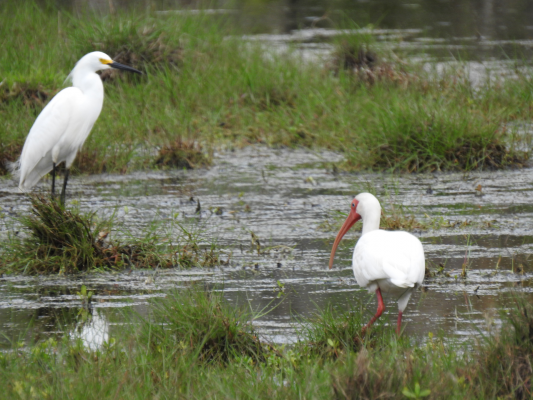Florida native plants for sustainable landscapes.
Visit PlantRealFlorida.org

NEWS RELEASE: For Immediate Release
Natural Resources Conservation Service is accepting applications for Wetland Reserve Easements and Agricultural Land Easements
GAINESVILLE, Florida, November 7, 2024 – Florida landowners and eligible entities interested in signing up for Fiscal Year (FY) 2025 Inflation Reduction Act (IRA), Agricultural Conservation Easement Program (ACEP) funding are reminded that the deadline to apply to be considered for both Wetland Reserve Easements (WRE) and Agricultural Land Easements (ALE) is Friday, December 20, 2024. The programs are administered by the United States Department of Agriculture (USDA) Natural Resources Conservation Service (NRCS). Applications can be submitted at any time, but to be considered for the FY 2025 IRA funding opportunities, completed applications must be received by the National cutoff date.
Applications for this IRA ACEP received after December 20, 2024, will be considered for the FY 2025 General Easements sign-up continuation. The deadline for the General Easements signup is January 31, 2025.
ACEP protects the agricultural viability and related conservation values of eligible land by limiting non-agricultural uses which negatively affect agricultural uses and conservation values. ACEP protects grazing uses and related conservation values by restoring or conserving eligible grazing land, as well as protecting, restoring, and enhancing wetlands on eligible land.
ACEP has two components:
Agricultural Land Easements (ALE) help private and Tribal landowners, land trusts, and other entities (such as state and local governments) to protect croplands and grasslands on working farms and ranches by limiting non-agricultural uses of the land through conservation easements.
Wetland Reserve Easements (WRE) help private and Tribal landowners protect, restore, and enhance wetlands which have been previously degraded due to agricultural uses.
The IRA included $1.4 billion in additional funding for ACEP over five years and it revised ACEP authority, providing IRA funding for easements that will most reduce, capture, avoid, or sequester greenhouse gas emissions, and extend regular program funding through FY 2031. NRCS is streamlining ACEP to ensure that the program is easier and more convenient to utilize, as well as to strengthen the implementation of the IRA. Specifically, NRCS is streamlining ACEP appraisals, land surveys, and certifying eligible entities who help NRCS and producers enroll land into ALE. In addition, NRCS is expanding the National priority areas eligible for IRA funding for ACEP easements. For more information, see The Agricultural Conservation Easement Program (ACEP) and the Inflation Reduction Act fact sheet.
On March 13, 2024, NRCS announced Agricultural Producers to Conserve Land through Climate-Smart Easements as part of President Biden’s Investing in America Agenda. This will invest approximately $138 million of financial assistance from the IRA in 138 new climate-smart conservation easements, through which farmers and ranchers are conserving wetlands, grasslands and prime farmlands.
For IRA ACEP-ALE, Florida NRCS is prioritizing and securing the following:
Grasslands in areas of highest risk for conversion to non-grassland uses, in order to prevent the release of soil carbon stores.
Agricultural lands under the threat of conversion to non-agricultural uses.
For IRA ACEP-WRE, NRCS is prioritizing the following:
Land with soils high in organic carbon.
Former or degraded wetlands that occur on lands that have been or are being used for the production of food and fiber, including rangeland, pastureland, and hayland.
Forest production lands, where the hydrology has been significantly degraded or modified.
Eligible landowners may choose to enroll in a permanent or 30-year WRE easement. Tribal landowners have the option of enrolling in 30-year contracts.
To learn more about NRCS programs, producers can contact their local USDA Service Center. Producers can also apply for NRCS programs, manage conservation plans and contracts, and view and print conservation maps by logging into their farmers.gov account. If you don’t have an account, sign up today.
USDA touches the lives of all Americans each day in so many positive ways. Under the Biden-Harris administration, USDA is transforming America’s food system with a greater focus on more resilient local and regional food production, fairer markets for all producers, ensuring access to safe, healthy and nutritious food in all communities, building new markets and streams of income for farmers and producers using climate smart food and forestry practices, making historic investments in infrastructure and clean energy capabilities in rural America, and committing to equity across the Department by removing systemic barriers and building a workforce more representative of America. To learn more, visit usda.gov.
For more information on NRCS in Florida,visit https://www.nrcs.usda.gov/conservation-basics/conservation-by-state/florida
Contacts:
Crenel Francis, Natural Resource Specialist – WRE 352-338-9508, crenel.francis@usda.gov
Sara May, Natural Resource Specialist – ALE, 352-338-9534, sara.may2@usda.gov
Cynthia Portalatin, Public Affairs Specialist, 352-338-9565, cynthia.portalatin@usda.gov